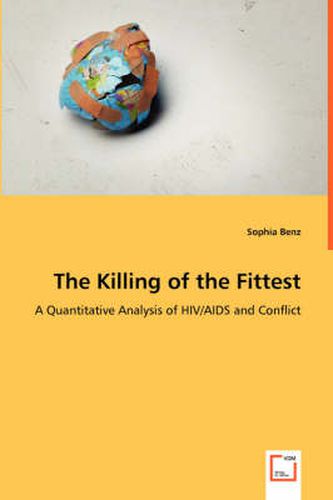Readings Newsletter
Become a Readings Member to make your shopping experience even easier.
Sign in or sign up for free!
You’re not far away from qualifying for FREE standard shipping within Australia
You’ve qualified for FREE standard shipping within Australia
The cart is loading…






This title is printed to order. This book may have been self-published. If so, we cannot guarantee the quality of the content. In the main most books will have gone through the editing process however some may not. We therefore suggest that you be aware of this before ordering this book. If in doubt check either the author or publisher’s details as we are unable to accept any returns unless they are faulty. Please contact us if you have any questions.
Increasingly it is argued that HIV/AIDS might threaten the internal and external security of severely affected societies due to its devastating impact on social, political, and economic variables. Although various studies have explored this issue, the question whether and how far HIV/AIDS may affect political stability, lead to state failure, or even to the outbreak of conflict requires empirical examination in the coming years as the epidemic unfolds and the necessary AIDS-death data become available. However, what can be empirically analyzed at this point is the reverse-causal effect or the question whether conflict experience impacts on HIV-prevalence rates. This book introduced decisive mechanisms linking the often complex and indirect relationship between conflict experience and HIV/AIDS. The final theoretical model draws on a social epidemiological approach enlarged by a micro-foundation as well as a conflict dimension. In addition, main results of a corresponding quantitative analysis based on a nearly complete sample of 197 countries are presented before some policy conclusions are drawn.
$9.00 standard shipping within Australia
FREE standard shipping within Australia for orders over $100.00
Express & International shipping calculated at checkout
This title is printed to order. This book may have been self-published. If so, we cannot guarantee the quality of the content. In the main most books will have gone through the editing process however some may not. We therefore suggest that you be aware of this before ordering this book. If in doubt check either the author or publisher’s details as we are unable to accept any returns unless they are faulty. Please contact us if you have any questions.
Increasingly it is argued that HIV/AIDS might threaten the internal and external security of severely affected societies due to its devastating impact on social, political, and economic variables. Although various studies have explored this issue, the question whether and how far HIV/AIDS may affect political stability, lead to state failure, or even to the outbreak of conflict requires empirical examination in the coming years as the epidemic unfolds and the necessary AIDS-death data become available. However, what can be empirically analyzed at this point is the reverse-causal effect or the question whether conflict experience impacts on HIV-prevalence rates. This book introduced decisive mechanisms linking the often complex and indirect relationship between conflict experience and HIV/AIDS. The final theoretical model draws on a social epidemiological approach enlarged by a micro-foundation as well as a conflict dimension. In addition, main results of a corresponding quantitative analysis based on a nearly complete sample of 197 countries are presented before some policy conclusions are drawn.